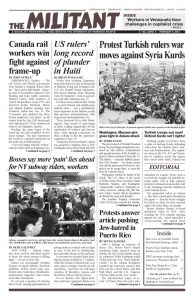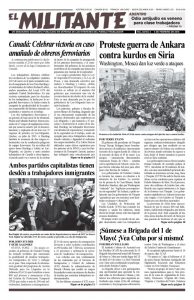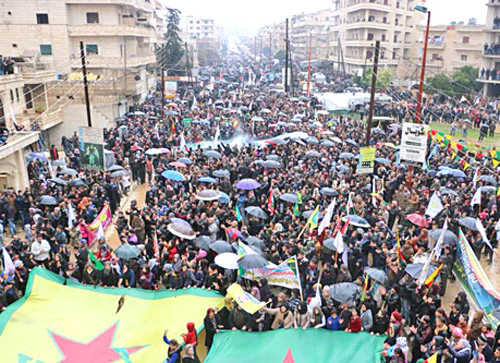The government of Turkish President Recep Tayyip Erdogan launched a combined air and artillery bombardment and ground invasion of the Kurdish region of Afrin in northwest Syria Jan. 19. The attacks — cynically dubbed Operation Olive Branch — are being carried out with the agreement of Moscow, who pulled out its troops there, to open the door for Ankara’s forces.
Washington washed its hands of the Kurds. The U.S. rulers, in the words of White House Press Secretary Sarah Huckabee Sanders, said Washington “understands” Ankara’s “legitimate security concerns,” asking only that Turkey’s rulers “ensure that its operations are limited in scope and duration.”
The Kurdish People’s Protection Units (YPG) have resisted the attacks. The Turkish ground troops, accompanied by Syrian allies, have reportedly made only limited gains so far.
Washington and Moscow, as well as the capitalist rulers in Tehran, Baghdad and throughout the region, are reassessing how best in changing circumstances to defend their national economic and political interests.
The attack comes amid widespread discontent among working people in Iran against the cleric-led counterrevolutionary regime’s military moves in the region that have meant growing numbers of young workers coming home in body bags.
The seven-year-long civil war in Syria grinds on, with a new regime offensive in Idlib province and continuing devastating consequences for working people.
The Turkish rulers have long sought to deal blows to the YPG and the struggle for Kurdish national rights in Syria. Some 30 million Kurds are an oppressed nationality spread across Iran, Iraq, Syria and Turkey. Through the course of the Syrian civil war the YPG has been the most effective force pushing out the reactionary Islamic State, and in the process some 2 million Kurds there have carved out an autonomous region along the Turkish border. The capitalist rulers in Ankara fear that advances by Kurds in Syria will inspire Kurds to fight for their national rights in Turkey.
Afrin province has a population of at least 800,000, including many recently arrived refugees fleeing the civil war. It is separated from the other Kurdish areas of northern Syria by a wedge of territory to its east, held by the Turkish-backed Free Syrian Army. These forces entered Syria in 2016, as part of a previous Turkish military incursion whose goal had been to push the Kurds east of the Euphrates River.
Erdogan says the Turkish rulers intend to “exterminate” the YPG in all areas west of the Euphrates River and will later force the YPG out of all areas near the Turkish border. Prime Minister Binali Yildirim says the Turkish government wants to create a 19-mile YPG-free zone inside Syria.
Erdogan charges the YPG with being the Syrian wing of the Kurdistan Workers Party (PKK) — an armed party in Turkey with Stalinist roots that has fought a guerrilla war against Ankara for most of three decades.
Protests against the Turkish government assault were organized across Afrin province, in Erbil in Iraqi Kurdistan, in London, cities in Germany and elsewhere. The Turkish government unleashed riot cops on Kurdish supporters in Istanbul as they protested the assault and sharply censored media reporting about it. Erdogan says he will “crush” all opposition in Turkey to Ankara’s military intervention in Syria.
Hundreds of protesters and opposition politicians have been arrested. Dozens have been rounded up for posting notes on social media questioning the attacks.
“This shows how people are afraid of keyboards, pens, words and writing,” Ayhan Bilgen, a leader of the Peoples’ Democratic Party (HDP) told the media.
Moscow tried to convince YPG leaders to hand over power in Afrin to the Assad regime, saying this would stop the Turkish rulers’ assault. “We drove the Syrian army out of Afrin five years ago, and it’s impossible to allow them back,” Bahjat Abdo, a YPG commander and Head of the Defense Authority in Afrin, told Kurdistan 24.
The U.S. rulers have demonstrated over decades that when push comes to shove they are deadly opponents of the Kurdish struggle for national rights. They were complicit with Baghdad’s seizure of Kurdish cities, land and oil fields around Kirkuk in October, backing the Iraqi rulers moves to stop any implementation of an overwhelming vote for independence by Kurds and others in Kurdistan.
Secretary of State Rex Tillerson announced Jan. 17 that U.S military deployment in Syria would continue indefinitely. Washington has some 2,000 troops there now. Days later, Defense Secretary James Mattis confirmed that rolling back Tehran’s rising influence in the Middle East was a central concern for Washington.
Workers protest Tehran’s wars
The capitalist rulers in Iran have used their army and militias to extend the sway of the country’s counterrevolutionary leaders across the region. Troops from Tehran’s Quds force, Hezbollah and other Iran-backed militias, supported by Moscow’s air power, were decisive in shoring up the Assad dictatorship. This means Tehran and its allied combatants hold sway from the Afghan border to the west across Iraq and Syria to Lebanon’s Mediterranean shore.
The deadly consequences at home of the Iranian rulers’ wars are class differentiated, hitting the working class hardest. At first the clerical rulers tried to conceal the extent of their military moves. But as the number of dead mounted, they could no longer do so. Then they erected monuments and banners to Iran’s “martyrs” in working-class neighborhoods, hoping to whip up a patriotic support.
Workers there had given support — and voluntary participation — against the U.S.-backed war by Saddam Hussein seeking to bring down the revolution in Iran that overthrew the shah in 1979.
But nothing like that happened this time. The mounting toll from these counterrevolutionary conflicts has fueled a broader social and political crisis. The sacrifices the regime’s wars imposed on workers led to the working-class uprising that swept 90 Iranian cities and towns in a 14-day period earlier this month. Quieted for now by a wave of arrests and deployment of Revolutionary Guard forces to working-class areas across Iran, the discontent continues to simmer.
The question of war — and similar broad questions of morality, culture and politics — are the deepest causes for working-class action.
Kazem Sadighi, a prominent clerical leader, gave a sermon Jan. 12 calling the working-class demonstrators “garbage” — much like Hillary Clinton’s 2016 description of Donald Trump’s working-class voters as “deplorables.” This reflects the contemptuous view of the working class widely held among capitalist rulers and their middle-class supporters the world over.


